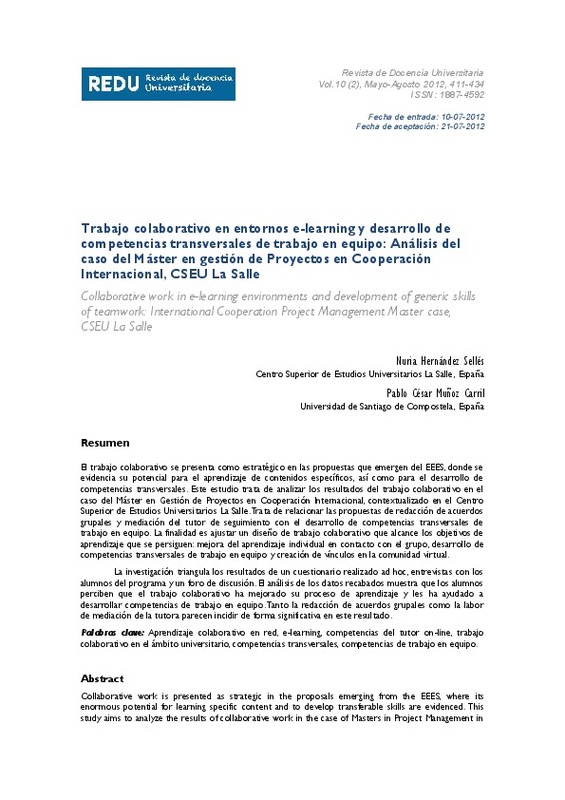Anderson, T. y Kanuka, H. (2003). E-Research: Methods, Strategies and Issues. Boston: Pearson Education.
Bawane, J. y Spector,M. (2009). Priorization of online instructor roles: implications for competency-based teacher education programs. En Distance Education. Vol. 30, n.3, pp. 383-397.
Beichner, R. y Saul, J. (2003). Introduction to the SCALE-UP (Student -Centered Activities for Large Enrollment Undergraduate Programs) project. Recuperado el 26 de diciembre de 2011 de:://www.ncsu.edu/PER/Articles/Varenna_SCALEUP_Paper.pdf. North Carolina State University Physics Education R & D Group Web site.
[+]
Anderson, T. y Kanuka, H. (2003). E-Research: Methods, Strategies and Issues. Boston: Pearson Education.
Bawane, J. y Spector,M. (2009). Priorization of online instructor roles: implications for competency-based teacher education programs. En Distance Education. Vol. 30, n.3, pp. 383-397.
Beichner, R. y Saul, J. (2003). Introduction to the SCALE-UP (Student -Centered Activities for Large Enrollment Undergraduate Programs) project. Recuperado el 26 de diciembre de 2011 de:://www.ncsu.edu/PER/Articles/Varenna_SCALEUP_Paper.pdf. North Carolina State University Physics Education R & D Group Web site.
Brown, R. W. (1995). Auto rating: Getting individual marks from team marks and enhancing teamwork. Presentado en Frontiers in Education Conference. Pittsburgh: IEEE/ASEE.
Castells, M. (1997). La era de la información: economía, sociedad y cultura. Vol I. La sociedad red. Madrid: Alianza.
Cohen, L. y Manion, L. (1990). Métodos de investigación educativa. Madrid: La Muralla.
Coll, C. y Solé, I. (1990). La interacción profesor/alumno en el proceso de enseñanza y aprendizaje. En C. Coll, Palacios, J., Marchesi, A. (Ed.), Desarrollo psicológico y educación II. Madrid: Alianza.
Duart, J. y Sangrá A. (2000). Aprender en la virtualidad. Barcelona: Gedisa.
Drucker, P. F. (1992). The New Society of Organizations. Harvard Business Review, SeptiembreOctubre, 95-104.
Echazarreta, C.; Prados, F., Poch, J. y Soler, J. (2009) La competencia «El trabajo colaborativo»: una oportunidad para incorporar las TIC en la didáctica universitaria. Descripción de la experiencia con la plataforma ACME (UdG). En UOC Papers Revista sobre la sociedad del conocimiento, 8, pp13-23.
European Commission (1995). Teaching and Learning. Towards the Learning Society. Luxembourg: Office for Official Publications of the European Communities
Felder, R. y Brent, R. (2001). FAQs-3. Groupwork in Distance Learning. Chem. Engr. Education, 35(2), 102-103. En http://www.ncsu.edu/felder-public/Columns/FAQs-3.html
Friedman, T. (2007). The World is Flat. Nueva York: Farrar, Straus and Giroux.
Gallop, R. (2003). Virtually an Online Experience, Access All Areas: Widening Participation in Postgraduate Education. The Annual Conference of the National Postgraduate Committee. Warwick
Guitert, M., Guerrero, A., Romeu, T. y Padros A. (2008). ICT competences for net generation students. International Conference on Advanced Learning Technologies ICALT (IEEE). Santander.
González, J. y Wagenaar, R.(ed). (2003). Tunning educational structures in Europe II: universities' constitution to the Bologna process. Bilbao: Publicaciones de la Universidad de Deusto.
Haller, C. Gallagher, V. Weldon, T. y Felder, R. (2000). Dynamics of Peer Education in Cooperative Learning Workgroups. J. Engr. Education, 89(3), 285-293
Hancock, B. (1998). Trent Focus for Research and Development in Primary Health Care: An Introduction to Qualitative Research. Nottingham: Trent Focus.
International Board of Standards for Training, Performance and Instruction (IBSTPI). (2007). Competencies. Recuperado el 6 de Julio de 2012 de http://www.ibstpi.org/competencies.htm
Johnson, D., Johnson, R. y Smith, K. (1991). Active Learning: cooperation in the college classromm. Edina, Minessota: Interaction Book Company.
Johnson, D., Johnson, R., (1999). Aprender juntos y solos. Aprendizaje cooperativo, competitivo e individualista. Buenos Aires: Grupo Editorial Aique S. A.
Johnson, R. (1985). Student-Student Interaction Ignored but Powerful. En Journal of Teacher Education, Julio-Agosto, pp 22-26.
Lewin, K. (1951). Field Theory in Social Science. New York: Harper.
Lutfi, T. et al. (2001). El ciberprofesor formador en la aldea global. Recuperado el 12 de junio de 2012 de http://tecnologiaedu.us.es/nweb/htm/pdf/202.pdf
Martínez, A. y Gómez, J. (2011). Aprender cooperando: De la fundamentación a la práctica. Una propuesta metodológica. Indivisa, Boletín de Estudios de Investigación, 2011, nº 12. ISSN: 1579-3141.
Martínez, M. (2006). La Investigación Cualitativa (Síntesis conceptual). Revista de investigación en psicología, ISSN 1560-909X, Vol. 9, Nº. 1, 2006, págs. 123-146.
Muñoz, P. y González, M. (2009). El diseño de materiales de aprendizaje multimedia y las nuevas competencias del docente en contextos teleformativos. Madrid: Bubok.
Nardi, B. A. (Ed.) (1996). Context and consciousness: Activity theory and human-computer interaction. Cambridge, MA: The MIT Press.
Oakley, B., Felder, R.M., Brent, R., & Elhajj, I. (2004). Turning student groups into effective teams, Journal of Student Centered Learning, 2(1), pp 9-34.
Oakley, B., Hanna, D. Kuzmyn, y Felder, R. (2007). Best Practices Involving Teamwork in the Classroom: Results from a Survey of 6435 Engineering Student Respondents. IEEE Transactions on Education, 50(3), pp 266-272.
Palloff, R., y Pratt, K. (1999). Building learning communities in cyberspace: Effective strategies for the online classroom. San Francisco: Joseey-Bass.
Riba, C (2009). El procés d'investigació científica. Barcelona: FUOC.
Rosenberg, M. (2001). E-learning: Strategies for delivering knowledge in the digital age. New York: McGraw-Hill, pp 28.
Shank, P. (2004). Competencies for online instructors: Why have instructor competencies for online instructors? Recuperado el 6 de junio de 2012 de http://www.learningpeaks.com/instrcomp.pdf
Stahl, G., Koschmann, T. y Suthers, D. (2006). Computer-supported collaborative learning: An historical perspective. En R. K. Sawyer (Ed.), Cambridge handbook of the learning sciences. Cambridge, UK: Cambridge University Press, pp. 409-426.
Medina, R., Suthers, D. (2008). Bringing representational practice from log to light. Proceedings of the 8th international conference on International conference for the learning sciences, pp 59-66.
UNESCO. (1998). Conferencia Mundial sobre la Educación Superior -La Educación Superior en el Siglo XXI: Visión y Acción. Recuperado el 4 de julio de 2012 de http://portal.unesco.org/education/en/ev.phpURL_ID=1935&URL_DO=DO_TOPIC&URL_SECTION=201.html
UNESCO. (2005). Regional guidelines on teacher development for pedagogy-technology integration (Working Draft). Bangkok, Thailand: UNESCO. Recuperado el 6 de julio de 2012 de http://unesdoc.unesco.org/images/0014/001405/140577e.pdf
Yin, R. K. (2009). Case Study Research: design and methods. Thousand Oaks, CA: Sage.
Zabalza, M. (2000): La enseñanza universitaria: el escenario y los protagonistas. Madrid: Narcea.
[-]








